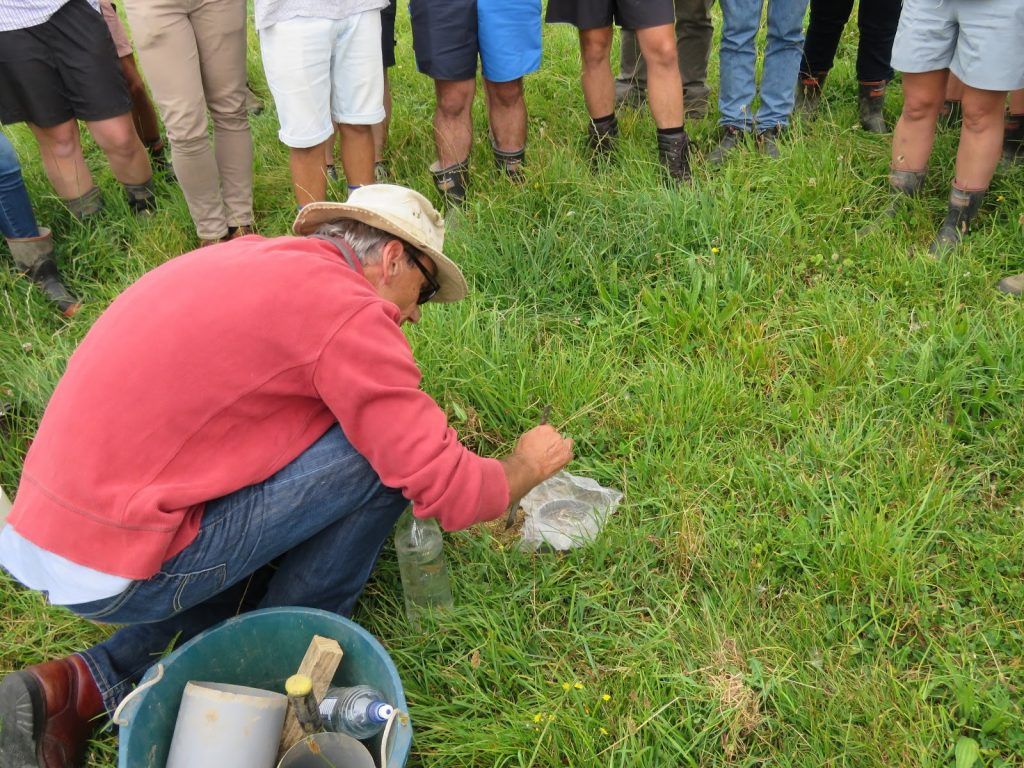Ph: 06 280 0938
Regenerative Agriculture makes sense – so why have I shunned it for 7 years?

The ability to reflect is so important for your development and growth, so the experts say. And yep that’s fairly true. What these experts don’t say, is that you are going to uncover some very uncomfortable truths from time to time.
This has been my reality over the past few months, and once again I marvel at my ability to be such a pig headed dick.
This Blog was going to be written in a few months time, but I am too excited and agitated to wait that long. It’s a story of hearing the same message from different sources, many times before the penny dropped for me, and for the first time in maybe 20 years I am truly excited about the future of agriculture. It feels so good.
And a quick reference point, I was a Sheep, Beef and Deer farmer for 30 years before starting Collective Intelligence.
So….. Seven years ago I was introduced to a concept called Regenerative Farming, by a passionate and knowledgeable advocate Jules Matthews. Now Jules is not what you would necessarily consider mainstream, but she is articulate and smart. She talked about her work with Nicole Masters, an Agri-ecologist, on a farm in Hawkes Bay, and I listened. But I was listening to win. Not listening to learn. These two listening styles look similar from the outside, but get processed very differently on the inside.
I was sort of polite to Jules, but thought, this is just mumbo jumbo farming, and will not possibly produce enough food to feed the world. Unlike conventional farming.
And I have been very critical of organic farming for many years, as often their practices were more harmful to animals and the environment, and I just dumped Regenerative Agriculture into that category.
I kept on hearing snippets about Regenerative Agriculture over the next few years, but no personal spike in interest at all. We have a member Lance Gillespie, a dairy farmer, who is into Regenerative Agriculture, and I would hear about dung beetles, which was intriguing, but still not getting through.
2018 would prove to be the year that cracks appeared in my rigid attitude.
The first crack was created while listening to a speech by Melissa Clark- Reynolds given at an Edmund Hillary Fellowship event:
Now Melissa is credible in the tech world for sure, but when she starts talking about ‘Love’ in a farming sense, I shook my head. She then went on to talk about Regenerative Farming. Now I have had the pleasure of meeting Melissa, she’s sharp. Why would she be on about this stuff?
In August I wrote about my experience of the wine industry, through sponsoring the young winemaker awards in 2018. In here I mention my work with the Te Mana lamb program in the deep south. This innovated initiative lead by geneticist Aimee Charteris, and talented group of farmers have developed an extensive flock of sheep, where the lambs have similar levels of Omega 3, as high as a fatty fish – meaning it not only tasted great but is good for you. They have created this through an complex genetic program that has had tens of millions of dollars invested and years of blood sweat and tears.
Meanwhile, I hear about a farmer named David Crutchley, based in the beautiful Danseys Pass region, who also has developed a lamb high in Omega 3, under the brand Provenance lamb. However, he has developed this in a totally different way. He has used Regenerative Agriculture as the catalyst. Well, I did the only natural thing and promptly discredited David as a nutter. How could a lone farmer achieve this feat without all the science Te Mana had used?
By chance, I was staying with friends in Dunedin, and on Saturday night they invited friends Mari-Anne and Michael Coughlin to dinner. I have met them a number of times before, but had not realised that Michael (a chef) was the brand ambassador for Provenance lamb. Oh dear, when he started talking about this wonderful product I had to bite my tongue. I really wanted to say I think it’s nonsense to believe David Crutchley could do what he claims he has done.
And then I thought, what would a winemaker do? Get curious and ask to taste the product. Which I did, and Michael promptly couriered some Provenance lamb to our home.
Seismic crack two – Kate and I don’t eat a lot of meat. Used to, but our consumption is dropping. So we followed simple directions from Michael, and cooked enough lamb for two meals that night. We sat down, and proceeded to eat the most magnificent tasting, succulent lamb either of us had ever eaten. I could feel the omega 3 on my lips, and Kate and I just basked in the moment. When we were finished, we looked at each other, and then simultaneously said ‘let’s eat the rest now’. Which we did with absolute glee.
I was confused, and realised I had no idea what Regenerative Agriculture actually was. No idea. Had never really got curious.
How could a farming system create such magnificent food, and I not get interested?
Why had I not been more inquisitive? Because I had been a good farmer, who had been taught a method and executed it well. I was surrounded by people who thought like me, and my curiosity had been dulled by success of applying a different system.
I have had the pleasure of meeting David Crutchley and some of his family, and marvel at their tenacity and genius for what they have created. It hasn’t been easy for them, and is still not. They are going against the establishment. I have also talked to David about becoming NZ’s first certified B Corp certified farming business. Lets see what happens.
Remember that dairy farmer Lance Gillespie? Well he invited me to a Regenerative Agriculture field day on his farm in the beautiful area of Apiti (Northern Manawatu) recently, which I accepted.
And now for the tsunami – He said he had a speaker out from the USA by the name of Nicole Masters, who was very knowledgeable. The name didn’t drop until I arrived at the field day, and who was there to greet me, none other than Jules Matthews who first introduced me to Regenerative Agriculture seven long years ago. And of course the speaker from the USA, was her friend Nicole from Hawkes Bay, who she talked about seven long years ago.

The reason I have outlined the sequence of events, is to reflect, just how many times do we need to hear something that positive, before we listen fully? I am mystified by my resistance, and a little disappointed in myself. However, old dogs can learn new tricks, it just takes time for some.
Here’s some key messages from my learnings so far.
- Sustainable Farming is not the same as Regenerative. Regenerative means to regenerate – improve/heal/sort mistakes from the past.
- Glyphosate kills grass and also Algae in the soil. Which is the equivalent of killing plankton in the sea. I never realised that, and that’s a message I understand.
- Traditional farming focusses on growing grass. Regenerative Farming focuses on growing soil. That’s a huge point of difference.
- Regenerative Farming is not taught in Universities.
- Traditional fertiliser companies do not make money from Regenerative Farming, and guess what – they don’t like it! Their behaviour is similar to the tobacco companies of old.
- Soil under a Regenerative system absorbs more water = less flooding and less drought.
- Soil under a Regenerative system responds favourably within months.
- Food produced from a Regenerative system is more dense in nutrients = healthier.
- Nicole Masters is based in the States, because farmers have not responded to her work in New Zealand – yet.
Once I do work things out I like taking action, and have engaged a specialist consultant Dennis Nieuwkoop to help transition our wee farm ‘Raumai Iti’ to a fully Regenerative system. I’m excited, and ready to unlearn 30 years of beliefs.
However, it has amazed me how difficult it has been, to embrace fully this new thinking, as recently as two weeks ago. And, realising it would be very easy for me to sabotage this transition, and prove why it won’t work.
There will be a follow up Blog in the future, as I learn more of the technical aspects of Regenerative Farming, and record the progress on Raumai Iti.
Thanks Jules Matthews for starting the process, and Lance Gillespie for completing the loop.
To Nicole Masters, you are inspirational!
Collective Intelligence 2022 ©